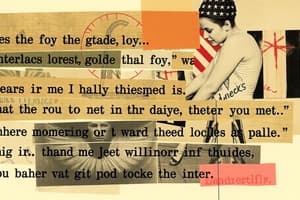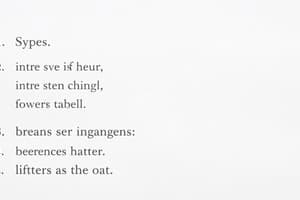Podcast
Questions and Answers
Which sentence type is characterized by posing a question and ending with a question mark?
Which sentence type is characterized by posing a question and ending with a question mark?
- Imperative
- Exclamatory
- Interrogative (correct)
- Declarative
Sentences that issue commands or requests, often with an implied subject, fall under which category?
Sentences that issue commands or requests, often with an implied subject, fall under which category?
- Declarative
- Interrogative
- Imperative (correct)
- Exclamatory
What type of sentence makes a statement and concludes with a period?
What type of sentence makes a statement and concludes with a period?
- Declarative (correct)
- Exclamatory
- Imperative
- Interrogative
Sentences expressing strong emotion, regardless of their underlying statement, command, or question structure, are classified as:
Sentences expressing strong emotion, regardless of their underlying statement, command, or question structure, are classified as:
A sentence composed of only one independent clause and no dependent clauses is known as a:
A sentence composed of only one independent clause and no dependent clauses is known as a:
Which of the following combinations can form a simple sentence?
Which of the following combinations can form a simple sentence?
What is the essential component of a simple sentence?
What is the essential component of a simple sentence?
Identify the sentence type: 'Close the door immediately!'
Identify the sentence type: 'Close the door immediately!'
A sentence with compound subjects and compound verbs, but still expressing a single complete thought, is categorized as a:
A sentence with compound subjects and compound verbs, but still expressing a single complete thought, is categorized as a:
What is a fundamental requirement for a group of words to be considered a sentence?
What is a fundamental requirement for a group of words to be considered a sentence?
In the sentence, 'The bouquet of roses are fragrant,' which word dictates the verb form according to subject-verb agreement rules?
In the sentence, 'The bouquet of roses are fragrant,' which word dictates the verb form according to subject-verb agreement rules?
Which sentence demonstrates correct subject-verb agreement when using 'some of'?
Which sentence demonstrates correct subject-verb agreement when using 'some of'?
Identify the sentence that correctly applies subject-verb agreement with 'or' connecting singular subjects.
Identify the sentence that correctly applies subject-verb agreement with 'or' connecting singular subjects.
Which sentence correctly uses a verb with plural subjects joined by 'or'?
Which sentence correctly uses a verb with plural subjects joined by 'or'?
What is the primary function of a pronoun in a sentence?
What is the primary function of a pronoun in a sentence?
Which of the following is NOT listed as a type of pronoun?
Which of the following is NOT listed as a type of pronoun?
What is the role of an antecedent in relation to a pronoun?
What is the role of an antecedent in relation to a pronoun?
What distinguishes a non-restrictive appositive from a restrictive appositive?
What distinguishes a non-restrictive appositive from a restrictive appositive?
Why are proper adjectives considered beneficial in writing?
Why are proper adjectives considered beneficial in writing?
Which suffix is commonly used to form proper adjectives from proper nouns?
Which suffix is commonly used to form proper adjectives from proper nouns?
Which characteristic is essential for a group of words to be considered a sentence?
Which characteristic is essential for a group of words to be considered a sentence?
In the English language, which type of noun is always capitalized?
In the English language, which type of noun is always capitalized?
Which of the following is an example of a compound noun?
Which of the following is an example of a compound noun?
What grammatical function does a gerund serve in a sentence?
What grammatical function does a gerund serve in a sentence?
To form the plural of most nouns, what is the typical grammatical modification?
To form the plural of most nouns, what is the typical grammatical modification?
For plural possessive nouns ending in 's', where should the apostrophe be placed?
For plural possessive nouns ending in 's', where should the apostrophe be placed?
Which verb tense indicates an action that will be completed at a specific point in the future?
Which verb tense indicates an action that will be completed at a specific point in the future?
In subject-verb agreement, what verb form is required when the subject is singular?
In subject-verb agreement, what verb form is required when the subject is singular?
When compound subjects are joined by 'and' and describe a single idea, what type of verb is used?
When compound subjects are joined by 'and' and describe a single idea, what type of verb is used?
Which of the following examples of compound subject and verb pairs demonstrates correct subject-verb agreement?
Which of the following examples of compound subject and verb pairs demonstrates correct subject-verb agreement?
Flashcards
Declarative Sentence
Declarative Sentence
A sentence that makes a statement and ends with a period.
Imperative Sentence
Imperative Sentence
A sentence that gives a command or makes a request and ends with a period.
Exclamatory Sentence
Exclamatory Sentence
A sentence that expresses strong emotion and ends with an exclamation point.
Interrogative Sentence
Interrogative Sentence
Signup and view all the flashcards
Sentence
Sentence
Signup and view all the flashcards
Simple Sentence
Simple Sentence
Signup and view all the flashcards
Independent Clause
Independent Clause
Signup and view all the flashcards
Dependent Clause
Dependent Clause
Signup and view all the flashcards
Subject
Subject
Signup and view all the flashcards
Verb
Verb
Signup and view all the flashcards
What is a sentence?
What is a sentence?
Signup and view all the flashcards
What is an independent clause?
What is an independent clause?
Signup and view all the flashcards
What is a compound sentence?
What is a compound sentence?
Signup and view all the flashcards
What are coordinating conjunctions?
What are coordinating conjunctions?
Signup and view all the flashcards
What is a noun?
What is a noun?
Signup and view all the flashcards
What is a proper noun?
What is a proper noun?
Signup and view all the flashcards
What is a possessive noun?
What is a possessive noun?
Signup and view all the flashcards
What is present tense?
What is present tense?
Signup and view all the flashcards
What is past tense?
What is past tense?
Signup and view all the flashcards
What is subject-verb agreement?
What is subject-verb agreement?
Signup and view all the flashcards
Plural Verbs with 'of'
Plural Verbs with 'of'
Signup and view all the flashcards
Singular verb with 'or'
Singular verb with 'or'
Signup and view all the flashcards
Plural verb with 'or'
Plural verb with 'or'
Signup and view all the flashcards
Singular/Plural with 'of'
Singular/Plural with 'of'
Signup and view all the flashcards
What is a pronoun?
What is a pronoun?
Signup and view all the flashcards
Pronoun-Antecedent Agreement
Pronoun-Antecedent Agreement
Signup and view all the flashcards
Appositive
Appositive
Signup and view all the flashcards
Proper Adjective
Proper Adjective
Signup and view all the flashcards
Restrictive vs. Non-restrictive Appositives
Restrictive vs. Non-restrictive Appositives
Signup and view all the flashcards
Proper Nouns and Proper Adjectives
Proper Nouns and Proper Adjectives
Signup and view all the flashcards
Study Notes
Sentence Types
- Four main types: declarative, imperative, exclamatory, interrogative
- Declarative sentences: make statements, end in periods
- Imperative sentences: make commands/demands, end in periods (often with implied subject)
- Exclamatory sentences: express strong emotion, end in exclamation points, can also fall into other categories
- Interrogative sentences: ask questions, end in question marks
- Some experts include optative sentences (expressing a wish) but these 4 are standard
Sentence Structures
- A sentence is a group of words expressing a complete thought
- Most sentences have a subject and predicate
- Four basic structures: simple, compound, complex, compound-complex
- Simple sentence: one independent clause, no dependent clauses
- Independent clause: subject and verb, expresses a complete thought, may have modifiers, and a verb object
- Ways to write simple sentences: single subject/verb, single subject/compound verb, compound subjects/single verb, compound subjects/compound verb
Parts of a Sentence: Subjects & Verbs
- Sentences begin with a capital letter
- Sentences end with punctuation
- Sentences express complete thoughts
- Sentences must have a subject
- Sentences must have a verb
- Verbs: action verbs (tell what the subject does) or linking verbs (connect subject to a subject complement)
- Subject complement: renames or describes the subject
Compound Sentences
- Compound sentences: two or more independent clauses joined by a comma and coordinating conjunction
- Independent clause: groups of words with subjects and verbs that express complete thoughts
- Coordinating conjunctions: connect words, phrases, or clauses that are parallel in structure
Nouns
- Nouns: words that denote people, places, things, or abstract concepts (events, ideas)
- Broadest word category in many languages
- Types of nouns:
- Singular nouns: one person/place/thing
- Plural nouns: more than one person/place/thing
- Common nouns: general items (not capitalized)
- Proper nouns: specific people/places/things (capitalized)
- Compound nouns: combine two or more words
- Abstract nouns: intangible concepts (ideas, emotions)
- Concrete nouns: things identifiable by the senses
- Collective nouns: groups or assemblies
- Nouns function with other parts (verbs, objects) to create meaning
- Gerunds: verbs used as nouns
Plural Nouns
- Singular and plural forms of nouns
- Most nouns make plural by adding 's'
- Nouns ending in 's', 'sh', 'ch', 'x', 'z' usually add 'es'
- Irregular plural forms: change or no change in spelling
Possessive Nouns
- Possessive nouns: show ownership
- Indicated by apostrophe + 's' (singular)
- Plural possessive nouns: apostrophe after the 's' (if it already ends in 's')
- False possessives: possession of inanimate objects, intangible things
Verb Tenses
- Verbs: words that describe actions
- Verb tense: shows time (present, past, future)
- Present tense: actions happening now or regularly
- Past tense: actions in the past
- Future tense: actions in the future
- Perfect tenses: action completed by a specific time
- Present perfect: action has been completed
- Past perfect: action had been completed
- Future perfect: action will have been completed
- Verb tense errors: inconsistencies in verb tense use
Subject-Verb Agreement
- Subject-verb agreement: subject and verb match in number
- Singular subjects need singular verbs
- Plural subjects need plural verbs
- Compound subjects ("and"): plural verb unless referring to one thing
- Distance, time, money: singular verb
- "Of" construction: noun before "of" determines verb number
- "Of" with "a lot," "some," "all": noun after "of" determines verb number
- Subjects with "or," "either/or," "neither/nor" (singular/plural): Match subject
Pronouns
- Pronouns: words that replace or stand in for nouns
- Types of pronouns: personal, impersonal, reflexive, intensive, relative, interrogative, demonstrative, indefinite
- Subjective pronouns: refer to nouns doing the action
- Objective pronouns: refer to nouns receiving the action
- Pronouns origin: ancient Greece, "in place of name"
Antecedents
- Antecedents: nouns to which a pronoun refers
- Pronoun-antecedent agreement: pronouns and antecedents must match in number
- Indefinite pronouns: use when quantity of antecedent is unknown.
- Vague antecedents: unclear; avoid them
- Implied antecedents: reader understands antecedent without it being named
Appositives
- Appositives: phrases that identify/clarify nouns/noun phrases
- Types: restrictive (no commas, needed to clarify noun); non-restrictive (commas, additional info)
- Use appositives carefully; avoid muddying sentences or creating repetition
Proper Adjectives
- Proper adjectives: adjectives from proper nouns (capitalized)
- Proper noun: specific name for a person or thing (capitalized)
- Adjective: describes a noun or pronoun
- Proper adjectives: conciseness, metaphorical connotations
Studying That Suits You
Use AI to generate personalized quizzes and flashcards to suit your learning preferences.




